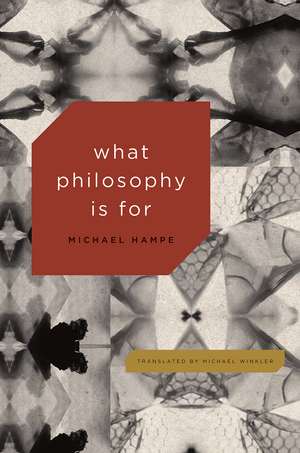What Philosophy Is For
Autor Michael Hampe Traducere de Michael Winkleren Limba Engleză Hardback – feb 2018
What is the state of philosophy today, and what might it be tomorrow? With What Philosophy Is For, Michael Hampe answers these questions by exploring the relationships among philosophy, education, science, and narrative, developing a Socratic critique of philosophical doctrines.
Philosophers generally develop systematic theories that lay out the basic structures of human experience, in order to teach the rest of humanity how to rightly understand our place in the world. This “scientific” approach to philosophy, Hampe argues, is too one-sided. In this magnum opus of an essay, Hampe aims to rescue philosophy from its current narrow claims of doctrine and to remind us what it is really for—to productively disillusion us into clearer thinking. Hampe takes us through twenty-five hundred years of intellectual history, starting with Socrates. That archetype of the philosophical teacher did not develop strict doctrines and rules, but rather criticized and refuted doctrines. With the Socratic method, we see the power of narration at work. Narrative and analytical disillusionment, Hampe argues, are the most helpful long-term enterprises of thought, the ones most worth preserving and developing again.
What Philosophy Is For is simultaneously an introduction, a critique, and a call to action. Hampe shows how and why philosophy became what it is today, and, crucially, shows what it could be once more, if it would only turn its back on its pretensions to dogma: a privileged space for reflecting on the human condition.
Philosophers generally develop systematic theories that lay out the basic structures of human experience, in order to teach the rest of humanity how to rightly understand our place in the world. This “scientific” approach to philosophy, Hampe argues, is too one-sided. In this magnum opus of an essay, Hampe aims to rescue philosophy from its current narrow claims of doctrine and to remind us what it is really for—to productively disillusion us into clearer thinking. Hampe takes us through twenty-five hundred years of intellectual history, starting with Socrates. That archetype of the philosophical teacher did not develop strict doctrines and rules, but rather criticized and refuted doctrines. With the Socratic method, we see the power of narration at work. Narrative and analytical disillusionment, Hampe argues, are the most helpful long-term enterprises of thought, the ones most worth preserving and developing again.
What Philosophy Is For is simultaneously an introduction, a critique, and a call to action. Hampe shows how and why philosophy became what it is today, and, crucially, shows what it could be once more, if it would only turn its back on its pretensions to dogma: a privileged space for reflecting on the human condition.
Preț: 260.25 lei
Preț vechi: 305.14 lei
-15% Nou
Puncte Express: 390
Preț estimativ în valută:
49.80€ • 51.99$ • 41.21£
49.80€ • 51.99$ • 41.21£
Carte indisponibilă temporar
Doresc să fiu notificat când acest titlu va fi disponibil:
Se trimite...
Preluare comenzi: 021 569.72.76
Specificații
ISBN-13: 9780226365282
ISBN-10: 022636528X
Pagini: 352
Dimensiuni: 152 x 229 x 28 mm
Greutate: 0.57 kg
Ediția:1
Editura: University of Chicago Press
Colecția University of Chicago Press
ISBN-10: 022636528X
Pagini: 352
Dimensiuni: 152 x 229 x 28 mm
Greutate: 0.57 kg
Ediția:1
Editura: University of Chicago Press
Colecția University of Chicago Press
Notă biografică
Michael Hampe is professor of philosophy at ETH Zurich. He is author of Four Meditationson Happiness and Tunguska, or the End of Nature, the latter also published by the University of Chicago Press. Michael Winkler is professor emeritus of German studies at Rice University. He has translated many books, including Uwe Steiner’s Walter Benjamin: An Introduction to His Work and Thought, also published by the University of Chicago Press.
Cuprins
Preface to the American Edition
1 Asserting, Narrating, Educating2 Maieutic and Academic Philosophy
3 Life, Subjectivity, Assimilation
4 The Life of Assertive Beings, Linguistic Dissidence
5 Ordinary Language, Theories, and Explanations
6 The Ordinary and Its Truth
7 Expertocracy and the Education of Individuals
8 Freedom, Necessity, Creativity
9 Reacting to the World
10 Telling Stories about Assertions and Arguments
11 Concreteness and Critique
12 Arriving at the End of Asserting
Epilogue to the History of Philosophy
Acknowledgments
Index
Acknowledgments
Index
Recenzii
"Hampe offers a learned reflection on the forms philosophy has taken, providing guideposts for the future development of the field. In ways reminiscent of Hadot and Dewey, he reanimates the Socratic project of treating philosophy as an activity rather than simply a doctrine, arguing that philosophy needs a renewed commitment to non-doctrinal, agnostic thinking for an era where technoscience is creating new forms of life."
